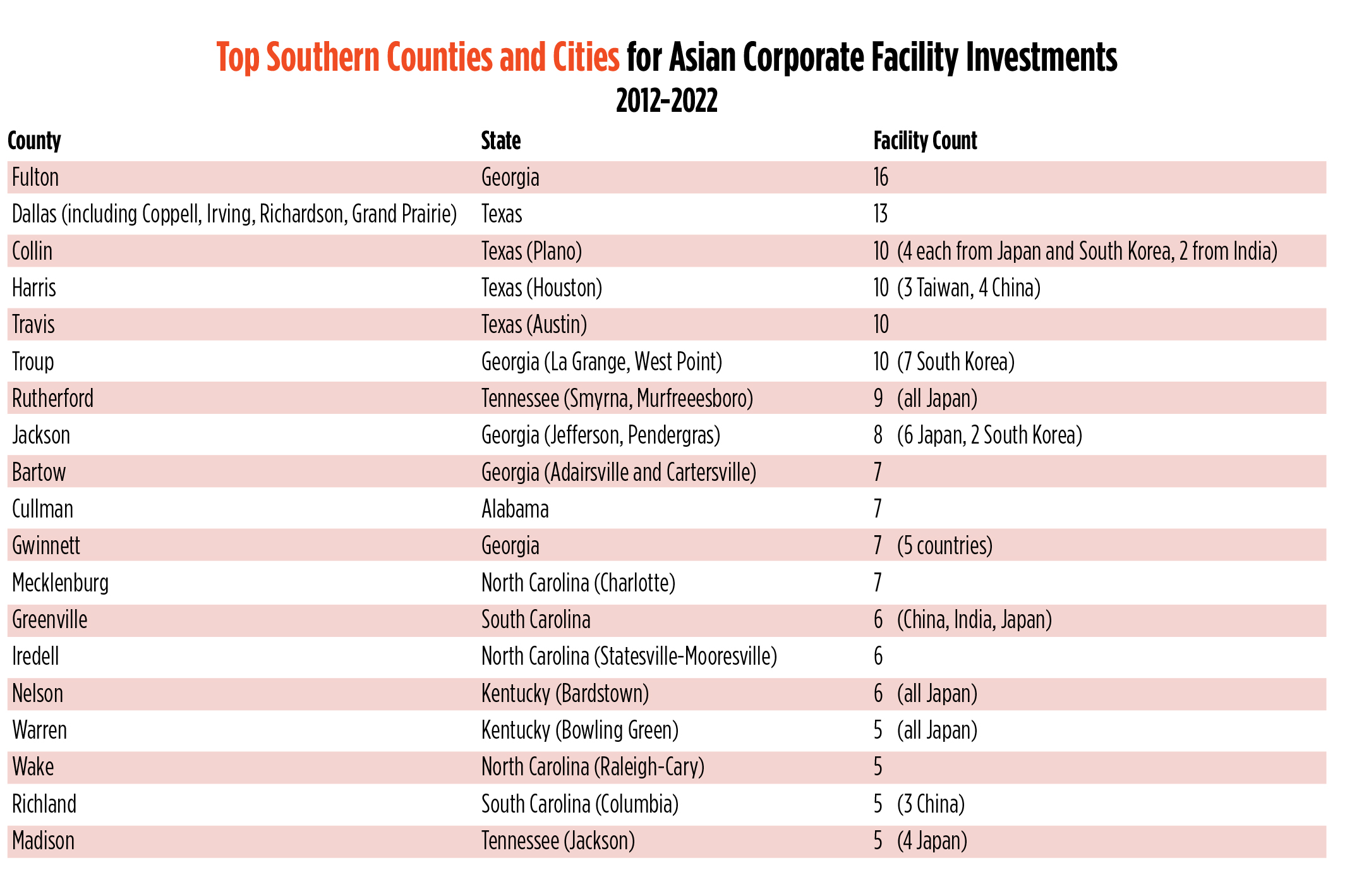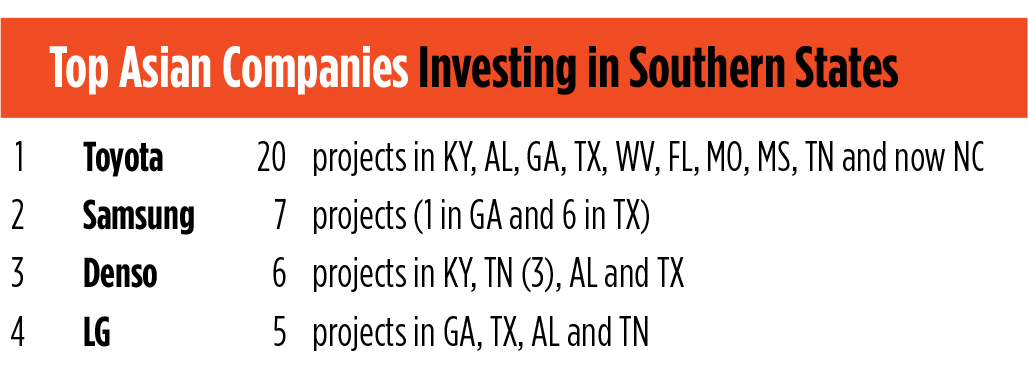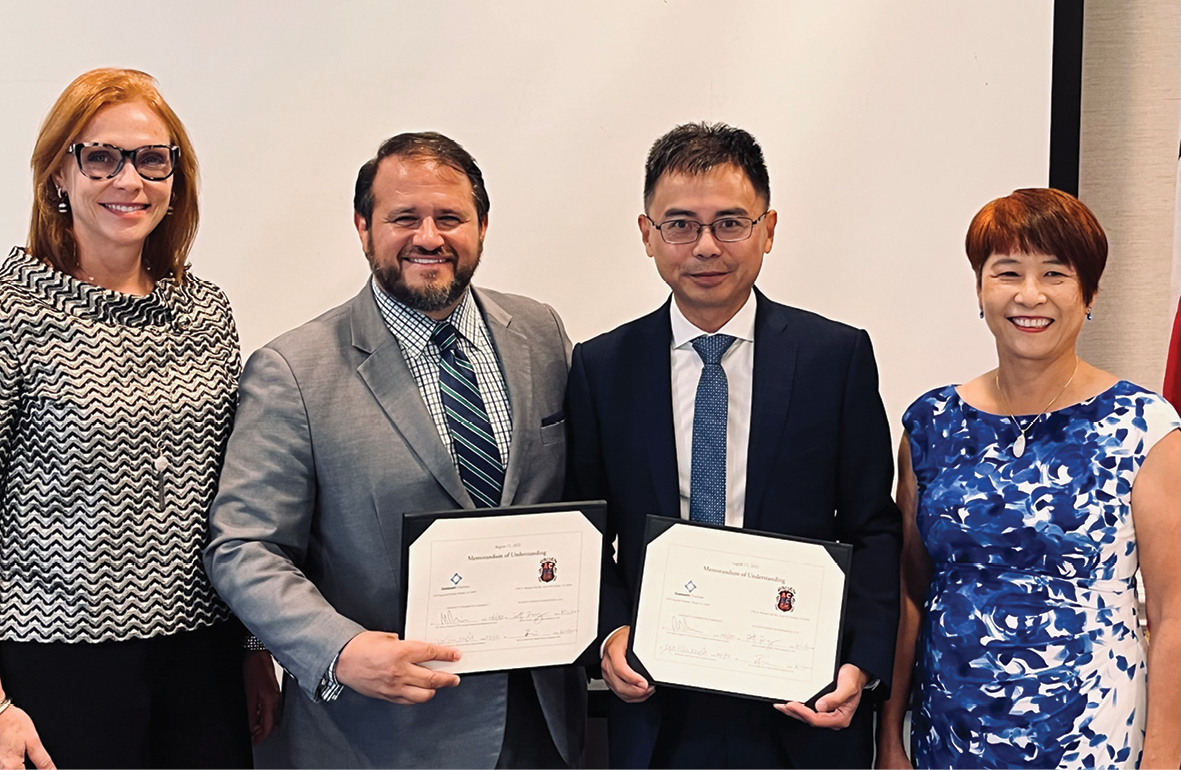The major projects just keep coming: Korean conglomerate Hyundai’s $5.5 billion, 8,100-job EV and battery complex coming to Bryan County, Georgia, near Savannah. Vietnam-based Vinfast’s $2 billion, 7,000-plus-job EV manufacturing ecosystem investment in Chatham County, North Carolina. Toyota Motor North America’s nearly $1.3 billion, 1,750-job EV battery plant landing at the Greensboro-Randolph megasite in the Piedmont Triad region of North Carolina. SK Battery’s EV battery complex following the curve of the planet for about a mile alongside I-85 in Commerce, Georgia.
Asian investment is plugged into the South. In Georgia alone, EV-related projects account for more than $13.54 billion in investment and the creation of nearly 18,000 jobs.
But evidence in Site Selection’s Conway Projects Database shows the connection’s been solid since well before EVs took the world by storm.
The data sometimes can be hard to divine. When the U.S. Bureau of Economic Analysis in July released data on U.S. inward FDI in 2021, there were tables displaying data broken out by state. But so many had their figures “suppressed to avoid disclosure of data on individual companies” that no real conclusions could be drawn.
That’s not the case with our database, which tracks major corporate end-user facility investments involving construction across all industries and all geographies as long as they meet one of these criteria: at least $1 million invested, at least 20 new jobs created or at least 20,000 new sq. ft. of space.
When I was asked to speak to state elected officials and policy experts this summer during an international relations forum at the 76th annual meeting of the Southern Legislative Conference in Oklahoma City, I decided to dive into the data. Since January 2012, we’ve documented 448 qualified projects that have come from companies based in Asian countries and have landed in one of the 15 states that comprise the Southern Legislative Conference. The charts in this story show some of the findings.

Among them: A total of 314 of the projects (70%) were manufacturing or some combination that included manufacturing. Around 50 had a logistics function. As for top investing countries, Japan, with 191 projects, accounts for almost 43% of all projects we’ve tracked over the decade.

Recent Asian corporate projects landing in the South include Korea-derived Duksan Electera America’s commitment in July to create 101 jobs and invest $95 million in its first North American manufacturing facility in Shelbyville, Tennessee. Also in July, Denkai America, the only North American manufacturer of high-quality electrodeposited copper foil used in printed electronics, will locate its new manufacturing facility and North American headquarters in the Augusta area in Richmond County, Georgia. An initial manufacturing investment of $150 million from the Japan-based company could lead to a total of $340 million invested and 250 new jobs over the next five years. In Alabama in July, Nippon Express U.S.A. launched its new Huntsville Logistics Center 2 in Huntsville, Alabama, to serve the parts and components logistics needs of the Southeast’s growing automotive industry.
In Oklahoma City, I found myself on a panel with Benjamin Hsu, director of the economic division of the Taipei Economic and Cultural Office in Houston, and Masahiro Sakurauchi, executive director of the Japan External Trade Organization (JETRO) office in Houston. Sakurauchi explained that corporate Japan has invested nearly $700 billion in the United States, and Japan is the leading source of FDI in 36 states.
Japanese companies employ more Americans than any other investing country, he said, and have increased their employment over the past 10 years by 82% while U.S. employers only increased by 11%.
“Japan is proud to create jobs here and work together for growth of American manufacturing,” Sakurauchi said, noting that Japan invests in U.S. innovation too. “Expenditure on R&D by Japanese companies was $12.9 billion in 2019, the largest among G7 countries,” he said. “The number increased by 2.5 times since the 2009 financial crisis. Exports by Japanese-owned companies are $82.3 billion, which accounts for 5% of total U.S. exports. All of this has been achieved through three decades of investment.”
 Ties That Bind
Ties That Bind
Georgia, Texas and Tennessee lead the way in total Asian corporate facility investments between 2012 and 2022, with Alabama and North Carolina close on Tennessee’s heels and Kentucky just behind them, even if the Bluegrass State gets extra credit for having lured Toyota’s first U.S. vehicle assembly plant in the 1980s.
Since then, even as Toyota’s southern U.S. project list has grown to 20 facilities in 10 states, the cultural and expatriate ties with Asian countries have grown as strong as the business.
In August, the Gwinnett Chamber in Gwinnett County, Georgia (home to Site Selection and one of the top counties in the South for Asian corporate investment) signed an MOU with the Atlanta Chinese Entrepreneur Club (ACEC). A release explained that, together with its economic development arm Partnership Gwinnett, the Gwinnett Chamber has led 15 business trade missions to China that have garnered the expansion or relocation of more than a dozen Chinese businesses in Gwinnett County, among them Hisense USA, Ningbo Self Electronics Corporation USA, WOLF Distributing Co., Self Electronics USA, TravelSky, LifeArt Cabinetry, Go Goal Cabinets, Tech-Long, Linhai Powersports and Ningbo Huige.. The agreement followed a similar MOU signing earlier this year with the Chinese Business Association of Atlanta. Almost 20% of all Chinese companies in Georgia are in Gwinnett.
“ACEC’s focus on international entrepreneurship in our community aligns with the Chamber’s values for innovation and inclusion,” said Nick Masino, president and CEO of the Gwinnett Chamber. “This agreement signifies a commitment to fostering these global entrepreneurs and furthers our mission to champion business.”
Overall, Gwinnett Chamber research staff say 39 Asian companies that Partnership Gwinnett touched have either relocated to or expanded in Gwinnett County since 2007, bringing $298.9 million in capital investment and 1,692 new jobs to Gwinnett. Among them is business related to that mammoth SK Battery complex up the road, as SK Inc. C&C, an affiliate of SK Innovation and subsidiary of SK Group, in March 2021 opened a $1.8 million, 15-job service office in the Sugarloaf Community Improvement District in the city of Duluth that will be focused on total IT service and system integration specifically for SK Battery America and other SK affiliates. In September 2021, SUNGDO ENG USA, a subsidiary of Korea-based Sungdo Engineering & Construction, opened its corporate U.S. headquarters in Suwanee with a pledge to create 30 jobs. The company provides technical construction services, and its clients include SK.
Andrew Carnes, vice president of economic development for Partnership Gwinnett, says even though the SK Battery plant is outside Gwinnett, some SK executives are making their homes in the county. That knowledge of the region helped as the spinoff digital innovation and support investment came to Duluth. Carnes in August was on the phone with SK discussing upcoming job fair events across the county.
Gwinnett’s employer base and population of 957,062 continue to grow more diverse, with 13.3% of that population identifying as Asian. The BAPS Shri Swaminarayan Mandir, a Hindu temple in Lilburn, continues to welcome visitors from all over the world. Cultural events include JapanFest, a Dragon Boat Festival and the Seoul of the South Food Tour. And those in the know know that Gwinnett’s stretch of Atlanta’s Buford Highway is home to Asian cuisine so good it draws tour buses and celebrity samplers from around the world.
Carnes says sister city arrangements have helped cement ties: Gwinnett has had a sister city relationship with Gangnam-Gu, outside of Seoul, for more than a decade. Such relationships are part of the international outreach his team makes with four countries in Asia and around seven in Europe.
“We’ve seen the fruits of the labor that comes out of those relationships,” he says, noting two supportive elements: the direct flights to almost anywhere from Atlanta Hartsfield-Jackson International Airport, and metro Atlanta’s bounty of consulates and trade offices. One new consul general from Japan, shortly after landing in Atlanta for the first time, traveled straight to Gwinnett’s JapanFest from the airport. “He stayed the entire day with his wife,” Carnes says. “After that, he went to his residence for the first time.”
Carnes says the way things already are spinning off from the SK investment reminds him of the ecosystem that has developed in western Georgia since Kia broke ground for its major assembly plant in West Point in western Georgia in 2006. The seeds for that investment were planted years earlier by former Georgia Gov. Sonny Perdue on a trade mission to Korea. “The relationships the state of Georgia and these communities have had go back decades,” says Carnes.
What’s in store for the decades to come? Given the recent VinFast investment in North Carolina, I ask Carnes about potential FDI from companies in Vietnam and other smaller Asian nations. “Tim Le in our Vietnam community has really opened my eyes to all the great industries they have in Vietnam,” Carnes says. “We’ve talked about it a number of times. Is there ROI there where it makes sense to add this to one of our international economic development trips?”
In August, Le, the broker/owner of NDI Maxim Real Estate LLC who began his career as a mechanical engineer for NEC Electronics USA, was appointed to the Foundation Board of Leadership Gwinnett.

Leaders from the Gwinnett Chamber in Gwinnett County, Georgia, and the Atlanta Chinese Entrepreneur Club signed an MOU in August supporting further growth of global entrepreneurs in the region.
Photo courtesy of Gwinnett Chamber
Japan’s Outward FDI

By Andrew Crowder, Tractus
Drivers of Japanese investment abroad are relatively few and are easy to understand; and they do not shift quickly.
Japan invests for existential reasons — to gain access to energy and food, to secure workforces (abroad), and to maintain access to advanced markets that can buy industrial manufactures. Investments into these broad sectors will continue and may accelerate.
Access to resources, especially energy and food, is essential for Japan; and its agriculture sector is strictly regulated. Mineral fuels (22% of total imports by value), machinery (15%), and food (9%) are Japan’s most important imports. The top three suppliers of these items in 2022 were China (23%), the EU (12%) and the United States (11%). Greenfield investments abroad into facilities that can secure these resources will expand.
In addition to these strategic investments, financial criteria also drive investment. The Bank of Japan and other financial institutions issue guidance that industries heed. One rule of thumb that these institutions advocate is that generally, investment should be undertaken in industries where potential returns are equal to or greater than 1.8 times the cost of capital. These industries include chemical, general machinery, and non-manufacturing industries in sectors including construction, and information & communications.
As Japan’s domestic interest rates are flat, this rule of thumb means that Japanese investors may invest at a lower threshold for returns than companies from countries with higher domestic interest rates. And in projects carrying less interest expense and debt, there may be more headspace during construction for larger or better-appointed facilities.
Another driver of Japanese investment in the U.S. is the need to leaven existing Japanese enterprises with innovation. Large Japanese enterprises are very good at producing a standardized product efficiently. However, many complex social problems — shifts in climate and weather; increasing needs for security and safety, from tracking food products to securing online identity; and shifting workstyles that require tools for management of remote, virtual, or shared workspaces — are demanding heightened levels of innovation. Japan’s largest enterprises are self-aware enough to recognize that this is not what they do well. So there has been an uptick in recent years in Japanese companies seeking to gain access to innovation through acquisition.
As of 2020, Japan’s total investment in the United States ($644.7 billion) was four times greater than total American investment ($144.2 billion) in Japan. Most Japanese investment in the U.S. is in the manufacturing sector, particularly the automotive sector, but also in pharmaceuticals, materials, and chemicals. These industries, in addition to being strategic, also meet benchmarks for financial returns.
Corporate Japan is emerging from the COVID-19 pandemic with its powder dry. Cash and deposits held by Japanese companies are increasing. According to the Ministry of Finance’s “Financial Statements Statistics of Corporations by Industry” the balance of cash and deposits at the end of fiscal 2020 reached 250 trillion yen, an increase of 37 trillion yen from the end of the previous fiscal year. There is pent-up demand in Japan for investment — that is, there was a pause in U.S. investment, but the long-term Japanese appetite for investment into the U.S. has not lessened.
Andrew Crowder is Chief Representative and Manager, Japan, for Tractus. For more information, visit www.tractus-asia.com.

